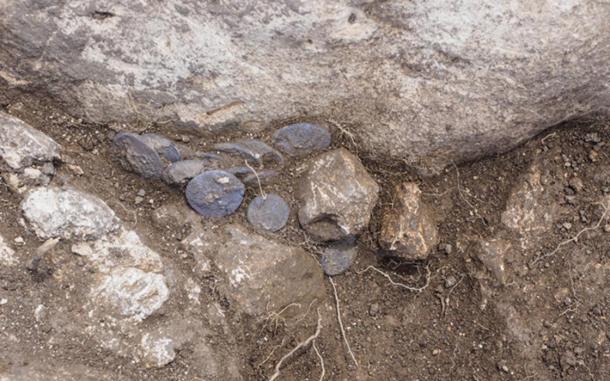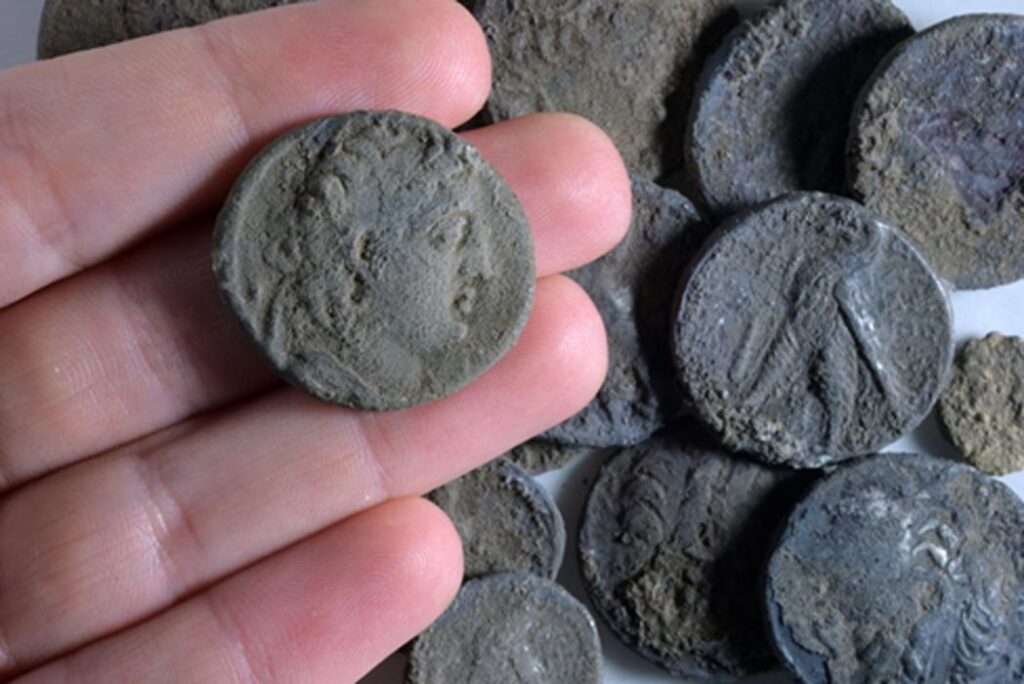Hoard of 2,150-year-old silver coins found in Modiin, Israel
Archeologists in Modiin reached a rare silver cache in an ancient wall gap. During a rescue excavation in central Israel, the garden of silver coins dated from the Hasmonean period(126 BCE) was shown.
“Perhaps the cache belonged to a Jew who hides his money in the expectation of coming back to recover it, but he was disappointed and never came back,” says the Modiin excavation managing director Abraham Tendler.

Shekelles and half-shekels (tetradrachm and didrachm) minted at Tyre City, bearing images of the king, Antiochus VII and his brother Demetrius II are the rare silver caches of the late Hasmonean period.
The treasure was placed in a rock crevice, opposite a wall of an impressive farmyard which was uncovered during the excavation.

“The cache, which consists of 16 coins, contains one or two coins from every year between 135–126 BCE, and a total of nine consecutive years are represented. It seems that some thought went into collecting the coins, and it is possible that the person who buried the cache was a coin collector.
He acted in just the same way as stamp and coin collectors manage collections today”. Dr. Donald Tzvi Ariel, the head of the Coin Depart-ment at the Israel Antiquities Authority said in a press statement from the IIA.
Or maybe: “The cache that we found is compelling evidence that one of the members of the estate who had saved his income for months needed to leave the house for some unknown reason.

He buried his money in the hope of coming back and collecting it, but was apparently unfortunate and never returned. It is exciting to think that the coin hoard was waiting here 2,140 years until we exposed it” Tendler said.
He added, “The findings from our excavation show that a Jewish fami-ly established an agricultural estate on this hill during the Hasmonean period. The family members planted olive trees and vineyards on the neighboring hills and grew grain in valleys.
An industrial area that includes an olive press and storehouses where the olive oil was kept is currently being uncovered next to the estate. Dozens of rock-hewn winepresses that reflect the importance of viti-culture and the wine industry in the area were exposed in the culti-vation plots next to the estate.
The estate house was built of massive walls in order to provide security from the attacks of marauding bandits.”
Numerous bronze coins minted by the Hasmonean kings were also discovered in the excavation.
They bear the names of the kings such as Yehohanan, Judah, Jonathan or Mattathias and his title: High Priest and Head of the Council of the Jews.
The finds indicate that the estate continued to operate throughout the Early Roman period.The Jewish inhabitants of the estate meticulously adhered to the laws of ritual purity and impurity: they installed ritual baths ( miqwe’ot) in their settlement and used vessels made of chalk, which according to Jewish law cannot become ritually unclean.
Evidence was discovered at the site suggesting that the residents of the estate also participated in the first revolt against the Romans that broke out in 66 CE: the coins that were exposed from this period are stamped with the date ‘Year Two’ of the revolt and the slogan ‘Free-dom of Zion’.
The estate continued to operate even after the destruction of the Tem-ple in 70 CE. “It seems that local residents did not give up hope of gaining their independence from Rome, and they were well-prepared to fight the enemy during the Bar Kokhba uprising”, said Tendler and continued.
The unique finds revealed in the excavation will be preserved in an archaeological park in the heart of the new neighborhood slated for construction in Modi‘in-Maccabim-Re‘ut.
